There’s a priest in the biology lab
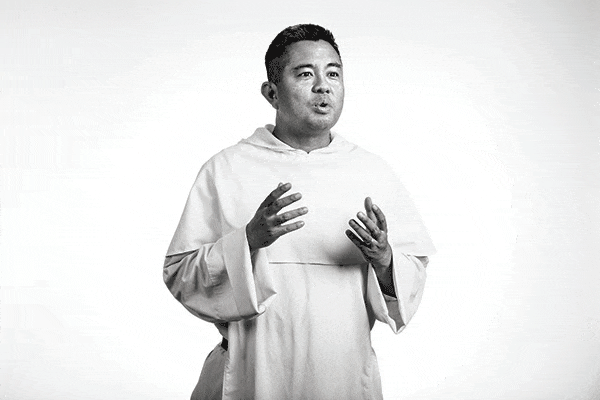
I’m a Dominican,” said Rev. Nicanor Austriaco, O.P., associate professor of biology. “We’re geeks for God. We preach for the love of Christ and for the salvation of souls.”
By Vicki-Ann Downing
Father Nic now has two doctorates — one in molecular biology from the Massachusetts Institute of Technology and one in moral theology from the University of Fribourg in Switzerland.
In his lab, with a dozen student researchers who call themselves “The Dead Yeast Society,” Father Nic studies the genetics of programmed cell death in yeast — in his words, “how cells commit suicide” — to determine why cancer cells don’t die. His research is funded through grants from the National Science Foundation, the National Institutes of Health, and the NIH-funded Rhode Island DeA Network of Biomedical Research Excellence, also known as RI-INBRE.
When he travels to the annual meetings of the American Society for Cell Biology, an international community of biologists, or to the International Meeting for Yeast Apoptosis, a worldwide gathering of scientists who study programmed death in yeast, he brings students along with him.
At the ASCB, “the students present their work at an international conference of scientists,” said Father Nic. “They wander around, stop in at poster presentations, and speak to other scientists. They realize how little they know, and it motivates them to do more. When they come back, they want to learn everything. If they fall in love with the discovery process, they will do it forever.”
At the IMYA in Gothenburg, Sweden, in June 2014, James O’Brien ’15 and Stephen Rogers ’15 presented posters in a competition with graduate students and post-doctoral fellows. O’Brien took second place. He hopes to attend medical school, but at Father Nic’s recommendation, will first spend six months serving in the slums of Manila through Dominican Volunteers International.
“He will be taught by the power of the poor to better understand himself, the world, and God,” said Father Nic. “He’s going to be served by the people he will be serving.”
Father Nic teaches students to be more than scientists, said O’Brien. Students enjoy learning in his lab, and they enjoy the sense of fun that Father Nic brings to it.
“One of the wonderful things about being taught by such a brilliant man is that while he’s training you as a scientist, he’s also reminding you that science isn’t everything,” said O’Brien. “The most profound memory I have is of all of us doing an experiment in the lab, but talking about whether miracles are reasonable, whether is it reasonable to believe in God, whether there is a scientific and empirical way to approach the big questions.
“Father Nic trained me for four years to be a scientist, and here I am making a pit stop in the third world before beginning my scientific career,” O’Brien said.
Father Nic teaches courses ranging from General Biology to a Liberal Arts Honors Program colloquium, Science and Religion. Next spring, he will partner with Dr. Colin King, assistant professor of philosophy, to teach a Development of Western Civilization colloquium for sophomores on religious and scientific belief.
“General Biology with Father Nic is akin to taking your brain, putting it in an oven, and melting it into gold,” said Ryan Frazier ’15, a biology major who worked in Father Nic’s lab for three years and who is volunteering in the Solomon Islands before applying to medical school. “You get rid of all the junk. He teaches you how to think.”
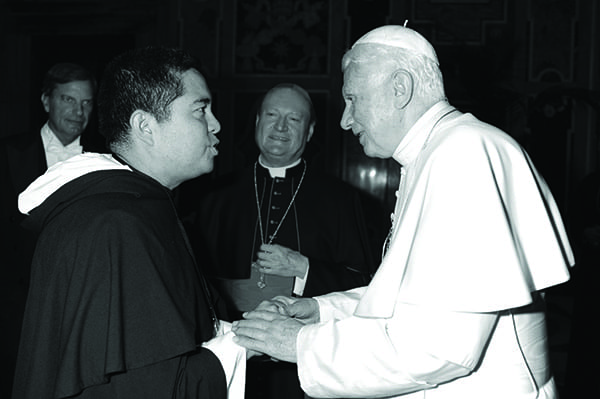
Father Nic, the son of engineers, is a native of the Philippines who grew up in Thailand and Malaysia. At 16, he received a full-tuition scholarship to the University of Pennsylvania to study for a bachelor’s degree in bioengineering. Following graduation, he taught fifth grade at an international school in Thailand for a year before entering MIT, where he helped biologist Dr. Leonard Guarente begin his study of aging.
An important moment occurred during Mass that changed Father Nic’s life forever, just before his MIT commencement.
“I met the Savior on the 7th of May in 1996 at 5:30 in the afternoon,” said Father Nic. “I was given the grace to know that He really is alive. It’s one thing to know it in your head, another to know it in your heart. It changed me forever. I discovered He was alive and loved me more than I ever imagined, and that I needed to spend the rest of my life getting to know Him better, telling others about Him, and bringing them to the one, true God.”
In 1997, Father Nic entered the Dominican Order of Preachers, the order that founded and continues to staff PC, and was ordained in 2004.
“It’s not that I chose the Dominicans — it’s more like I discovered that I have always been a Dominican,” said Father Nic. “The order gave me a concrete way to live out who I have always been. I saw that the order fits me. God had prepared me for it from the very beginning.”
When he joined the PC faculty in 2005, Father Nic took up residence among students on the second floor of Aquinas Hall — continuing a tradition of Dominicans residing in residence halls. He says the noise doesn’t bother him. He needs little sleep and often works into the early morning.
He also loves to travel — to make presentations, to attend conferences, to teach, and to celebrate the weddings of former students. He logs an average of 75,000 to 100,000 miles each year. During the 2014-15 academic year, while on sabbatical, he traveled 120,000 miles, to the Philippines, Africa, China, Italy, England, the Czech Republic, Slovakia, Poland, Canada, Mexico, and throughout the United States.
“I can sleep anywhere, and I love traveling,” said Father Nic. “When I was a kid I wanted to be an airline pilot. The thing I like about planes is that you can’t miss your next stop.”
A consultant on issues of bioethics, Father Nic received his doctorate in moral theology in May 2015. In the Diocese of Providence, he has served on the Our Lady of Fatima Hospital Medical Ethics Committee. He also speaks about the promise of adult stem cells to cure diseases. In 2011, he was a featured presenter at the first Vatican conference on the topic and met Pope Benedict XVI.
He also is a chaplain at the Massachusetts Correctional Institute in Norfolk, a medium-security prison 30 miles from Providence. He regularly celebrates Mass there and serves as spiritual advisor for about 40 inmates who are part of a chapter of the Dominican laity.
“Many are in prison for life,” said Father Nic. “They have taught me so much, because they are much more aware of God’s mercy than the rest of us.”
The Dominican Order, which will celebrate its 800th anniversary in 2016, was constituted as an order of priests and confessors.
“The Dominican charism (the gift of the Holy Spirit) is to preach and to teach, and to absolve for the salvation of souls,” Father Nic said. “It is one of the great charisms of the Church. I’ve discovered that our lives are ordered in so many ways by mercy. We preach mercy, we absolve in mercy. If the Dominicans didn’t exist, someone would have to invent us, because our charism is so essential for the life of the Church.”
With all his study, research, and travel, when does Father Nic find time to pray?
“I cannot go long without sitting down and having a talk with my Savior,” Father Nic said. “Late at night, I will walk on campus, praying the rosary, praying for my students, asking God to be merciful to them. After awhile, you just have to be quiet. You just have to sit. At heart, I am still an introvert. I like being by myself, with my savior.”
So the person teaching students in the biology lab — is he a professor or a priest?
“It’s me!” exclaimed Father Nic. “I don’t compartmentalize anything. I am first a priest. I am a Catholic and Dominican priest, who in the providence of God is also a biologist and a moral theologian. That’s the way it is.”
Science is, after all, the study of God’s creation — and “if given a chance, can move others to praise God for the beauty and the wonder of His work,” Father Nic said.
In 2020, Father Nic graduated with an MBA from PC’s School of Business.
Research students from the Austriaco lab
Through the years, the Austriaco Lab has produced physicians, dentists, scientists, health care professionals, a veterinarian — and in 2015, for the first time, a Dominican friar.
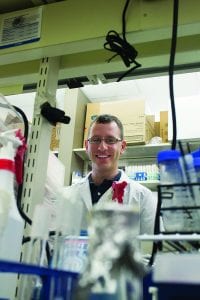
JAMES RITCH ’08
- Entered the Order of Preachers (Dominicans), 2015
- Laboratory manager for the Austriaco Lab, 2014-15
- Master’s degree in neuroscience, University of Massachusetts Medical School, 2013
- Researcher, MassGeneral Institute for Neurodegenerative Disease, Massachusetts General Hospital, 2008-2010
“I had my first biology class with Father Nic when he came to PC in 2005. He was this unknown professor back then with a Ph.D. in biology from MIT, one of the best institutions in the world for biology, if not the best.
“I joined his lab sophomore year. He is a good priest. An alum came in to the lab and said, ‘I was in a ditch, I hit rock bottom, and he helped me out of it.’ When people ask me who inspires you — it was Father Nic, through his example. He lives the life of a Dominican friar.”
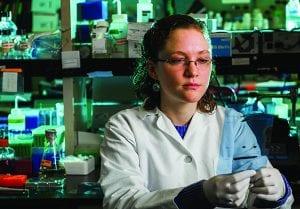
KATHERINE HELMING WALSH, PH.D. ’09
- Research scientist, Broad Institute of MIT and Harvard
- Ph.D. in biological and biomedical sciences, Harvard University, 2015
“When I was diagnosed with leukemia one year after graduating from PC, one of my first phone calls was to Father Nic. He came to the hospital in Boston that same day and provided an indescribable amount of support and comfort to my family and me during a very scary time.
“Not only did Father Nic visit me several times during my treatment, but he also drove up to Maine to celebrate my wedding Mass to another PC alum (Ryan Walsh ’09) four years later. Father Nic cares deeply about his students, biology, and his faith.”
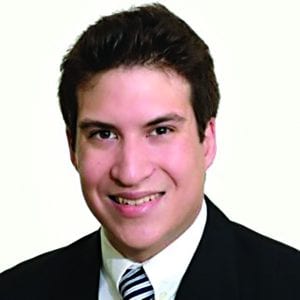
DANIEL GITTINGS, M.D. ’10
- Resident physician, Department of Orthopedic Surgery, Perelman School of Medicine, University of Pennsylvania, and fellow, McKay Orthopaedic Research Laboratory
- Doctor of medicine, Boston University School of Medicine, 2014
“Father Nic has inspired me in many ways: he has always encouraged me to think independently, be able to translate and communicate the complex language of science to those who may not understand, and also to be compassionate.
“I would not be the physician I am today without his guidance. To this day I consider him to be one of the most positive influences in my life.”
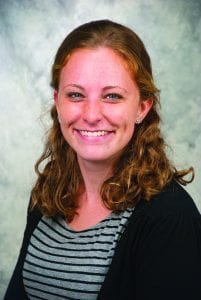
EMILY ROBLEE ’13
- Student, University of Connecticut School of Medicine
- Clinical information manager, Emergency Medical Associates, Our Lady of Fatima Hospital, North Providence, R.I., 2013-2014
“While I was working in Father Nic’s lab, I was often challenged by confusing results and became frustrated when I couldn’t obtain perfect data. Father Nic taught me how to ‘think like a scientist’ by realizing that there often isn’t a ‘right answer’ to scientific inquiries, and researchers can only design and perform experiments, determine their results, and interpret the results according to the trends observed.
“This was a lesson that was important to me as a student researcher and has remained important to me in medical school as I learn to solve complex medical problems.”






Comments on “There’s a priest in the biology lab”